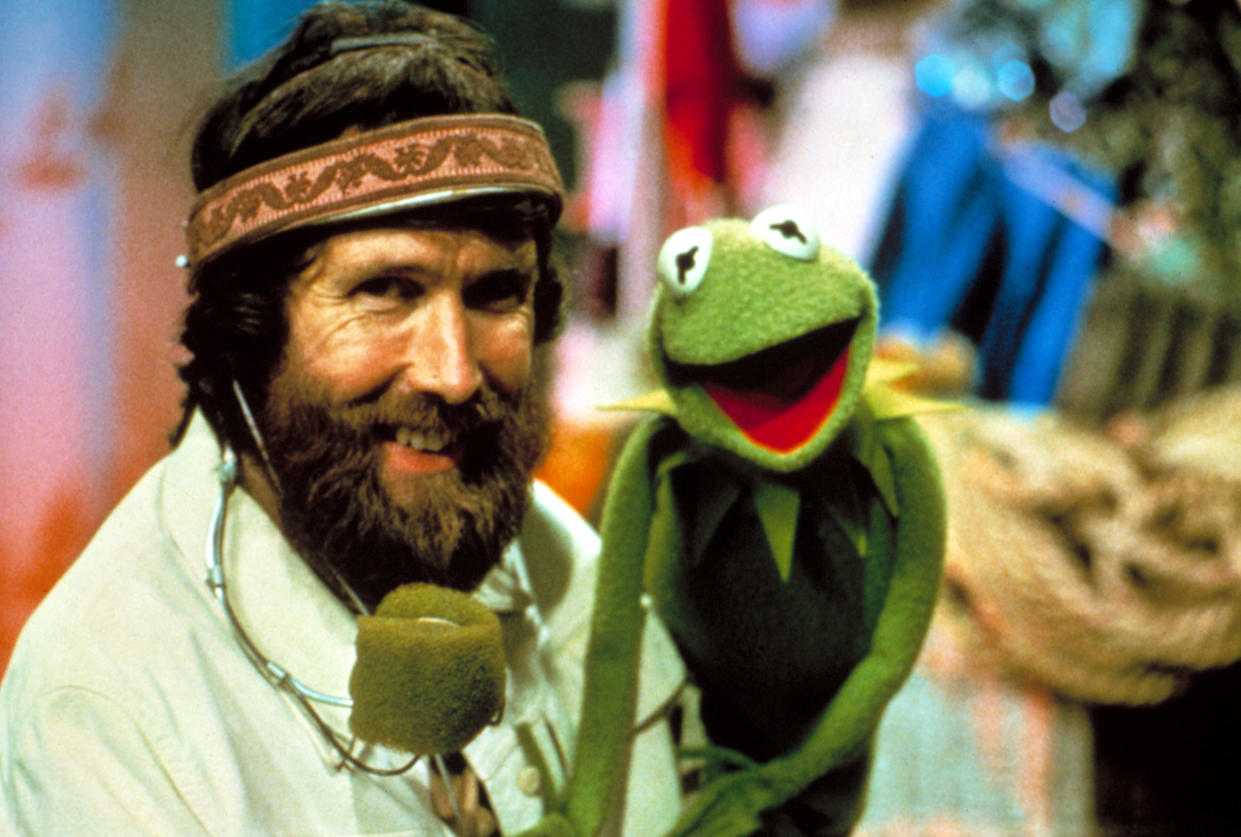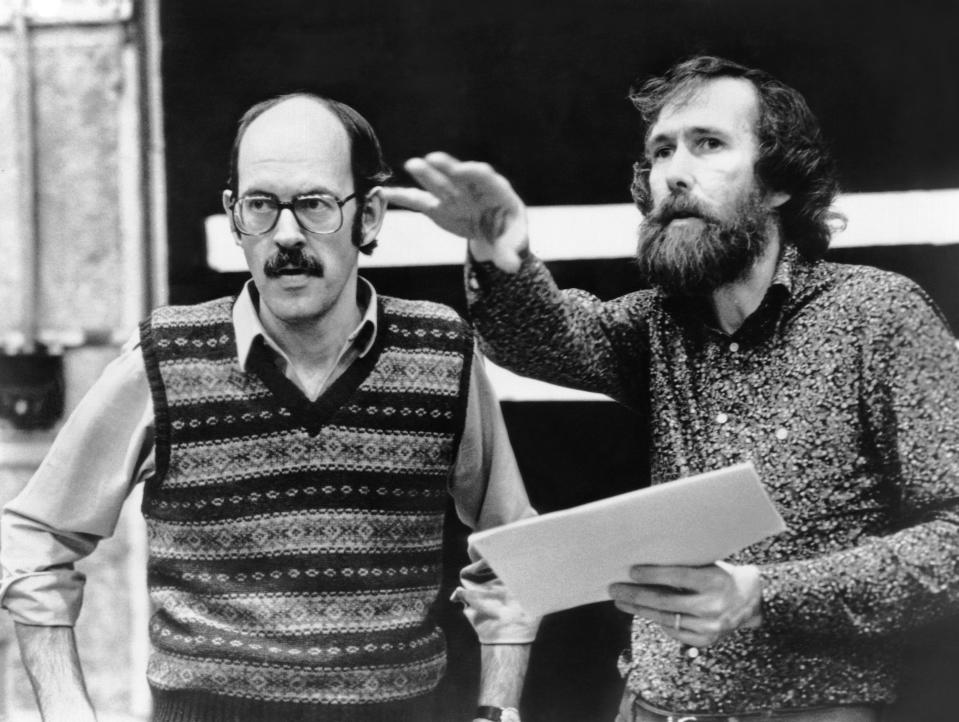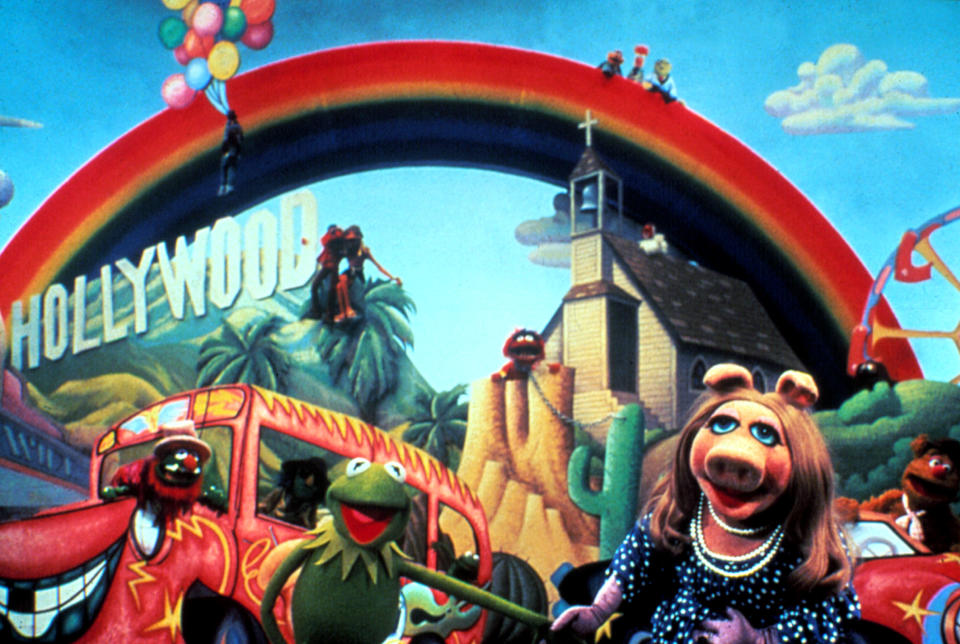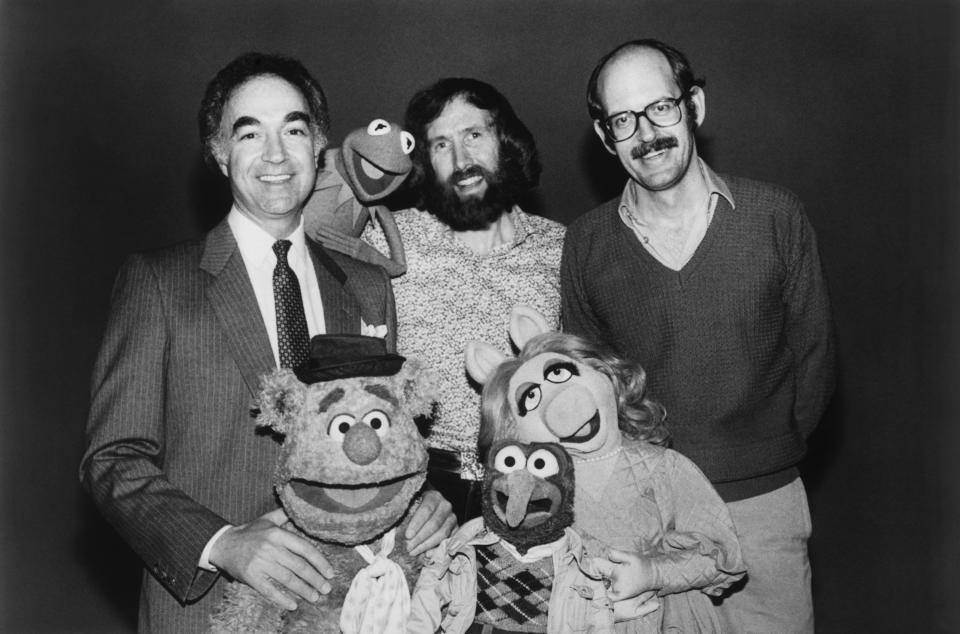This is why Jim Henson was the greatest boss ever

Frank Oz’s new documentary, Muppet Guys Talking, gathers five of the original Muppet performers for a funny, revealing conversation about their work with Jim Henson’s creations. In part, Oz made the film to honor the Muppets’ visionary founder, with whom he worked closely from 1963 until Henson’s death in 1990. It was Henson who brought this group together: Fran Brill (Prairie Dawn, Zoe) and the late Jerry Nelson (Count von Count, Mr. Snuffleupagus) began working with the Muppets on the first season of Sesame Street. Dave Goelz (Gonzo, Dr. Bunsen Honeydew) was an original performer on The Muppet Show. Bill Barretta (Pepe the King Prawn, Bobo the Bear) joined up with the Muppets in 1991, but now plays several of the characters Henson originated, including Rowlf the Dog and the Swedish Chef. And of course, Oz was Henson’s right-hand man (sometimes literally), performing Miss Piggy, Fozzie Bear, Bert, and Cookie Monster, among others, before moving on to his own directorial career.
In Muppet Guys Talking, conceived and produced by Oz’s wife, Victoria Labalme, the puppeteers’ friendly banter and storytelling illuminates Henson’s unique work and life philosophy, what they describe as a “culture of generosity” and a spirit of “joyous competition.” In Part 1 of our conversation with the “Muppet guys,” Yahoo Entertainment went in-depth with the performers about creating their characters and risking life and limb for the Muppets. In Part 2, Oz, Goelz, Brill, and Barretta share their memories of working with best-ever boss Henson, speculate on how he created unforgettable characters like Kermit, and reveal the Jim Henson philosophies that have stayed with them all their lives.
Yahoo Entertainment: Those of you who saw Jim Henson’s creative process up-close, what was that like?
Dave Goelz: Jim, he was just fluid and natural in everything he did. Everything seemed to come easily for him. His handwriting was so fluid! We’d be on the set and he’d have to write down a couple of notes real quick about something we were going to do, and my handwriting would get all crumpled and my hand would spasm, and he would just be flowing. Everything he did was just with great ease and grace.
Frank Oz: After Dark Crystal we got a review, in People magazine I think, and I framed it for Jim. It said something like, “Jim Henson’s imagination is like lava just flowing down a hill.” And it’s true.
Goelz: It’s the weirdest paradox because he worked so hard. He put in more work, more hours, more strain than anybody else, but it was an effortless process for him. It looked effortless.
Rowlf the Dog, performed by Jim Henson and Frank Oz, on The Jimmy Dean Show in 1964:
Did you get a sense of his characters developing over time, like Kermit?
Oz: Kermit, absolutely. I remember we were doing The Jimmy Dean Show, that’s when I came in 1963, and the real star was Rowlf the Dog. Kermit was totally unknown. He wasn’t even a frog, he was just a thing. And I remember Jim was trying to introduce Kermit into the second year, and he took this thing out, and they reacted, “Ugh! God, no, no.” And he put him away. So at that point, he was a complete nonentity. And then it took all this time and became who he was, and also became part of what was in Jim.
Goelz: For the people who are reading this: Frank accompanied that last speech with a gesture where he put his hands together like they were clapping, but with his fingers spread, and he slid it across the whole table to show the process he was talking about.
Oz: I really don’t know how Jim developed characters. Do you guys know? I have no idea.
Goelz: He didn’t talk about it.
Literal male chauvinist pig Link Hogthrob, performed by Jim Henson, in a collection of “Pigs in Space” sketches from The Muppet Show. Miss Piggy is performed by Frank Oz, and Dr. Strangepork by the late Jerry Nelson:
Oz: I don’t think he even developed characters. They just were there. I think he just got a funny idea in his head. Like Dr. Teeth — he thought, “It would be funny to do this,” and he just was it. Like Link Hogthrob, who I loved. He probably thought it was really funny to have this stupid male pig being macho. But it was, “Oh it’s a funny idea, that’s what I’m going to do” — and then that’s probably what he did.
Goelz: Yeah, he kept it simple. I remember I was there [working in the Muppet workshop] when the Link puppet was being built, and we all chipped in on ideas. He had chest hair, but we decided it was a merkin, it was a rug. And we were picking out gold chains for him to wear because he was kind of a chauvinist. Everybody was on the same train, you know? Jim would come every day and hear these ideas, and he’d decide to include them.
Oz: But his characters were more fully formed than ours — I mean mine, certainly — right away. It’s not that they traveled further necessarily, but they were more immediately defined.
Bill Barretta: Do you think he developed characters as he was maybe drawing or designing them? Like in his mind, he’s hearing their voices as he’s drawing?
Oz: I think so. Also Dr. Teeth is like Dr. John, that’s where it came from, and so he had a real great model for that.
Dr. Teeth and the Electric Mayhem perform “Tenderly” on The Muppet Show. Dr. Teeth was originated by Jim Henson and is now performed by Bill Barretta:
I want to ask all of you, what’s something that Jim gave you that you carry with you still?
Fran Brill: I have said this before, but he gave me the idea of just accepting whatever disaster’s going on in your life. Instead of fighting it, if you have no control over it, to just go “that’s the way it is” and let it happen. Like being stuck in a cab in traffic and knowing you’re going to miss your airplane. You could get terribly agitated, and he just sort of seemed to go, “Well, can’t do anything about it.” And that was like the opposite of what my parents would do. So I have tried to absorb that into my life and to just sort of roll with things a lot more.
Oz: Part of the reason Bert and Ernie worked is because Jim flowed with the river. I fought against the river. And to a degree I still do, and I enjoy it! But much less so because of —
Brill: For the readers, he just pointed to his wife, Victoria.
Bert and Ernie, performed by Frank Oz and Jim Henson, on Sesame Street:
Oz: I also learned, like Franny, to accept more. If something goes wrong, don’t scream and yell, just accept it and move on with the next thing. It’s amazing. I’ve told this story before, but this is how fatalistic he was and how he accepted things: We were in an airplane together, as we were many, many times. He was in the window seat and I was next to him. He was working. And I looked out, and the engine was on fire. And I said, “Jim, the engine’s on fire!” He said, “Oh, yeah.” And he kept on working. But that was Jim. He would just say, “Whatever happens, it’ll be taken care of.”
Brill: He must have gotten that from his parents, don’t you think? Though he did do a lot of things like EST and meditation.
Oz: Toward the end of his life he was meditating a lot.
Brill: Yeah. I think he was always exploring things, and he would take pieces of that kind of thinking, or a piece from somewhere else, and always trying to make himself better, perhaps? Or more aware?
Oz: Also the sense of work ethic. I mean all of us worked like hell.
Brill: “Jim Henson hours.”
Oz: And we worked and worked really hard for long hours, and prior to meeting Jim I probably would have complained. No complaints with Jim because he worked harder than us. And I think I learned a great work ethic from him. Many, many more things too.

Goelz: There are so many things. Empathy, I think empathy.
Brill: Enormous empathy.
Goelz: He was a great influence on all of us. And it’s not just us at the table, it’s everybody who worked for him: the workshop, the licensing people, the marketing people, the publishing people, the creature shop people. Everybody in the company was influenced by him. We had a reunion a few years ago where hundreds of people showed up, and it could be anybody that we worked with — so anybody on any of our crews, or in the company. And the refrain that you heard all evening from everybody, even people who had only worked there for a year, was, “That was the best job I ever had.” The culture was just so joyous. And in a way, for all of us who worked on Muppet Guys Talking, it’s a revisitation of that.
Oz: And Jim legitimately — unless you did something bad to him like betrayed him or something — he loved people. He’d play with us, and he’d go into the workshop and he’d put his arm around people, sincerely, not like he was managing people. He was really fascinated. And I remember many times going into a situation where there were a lot of people and there was Jim Henson, and they wanted to talk to him. And he’d just talk to anybody. I’d have to pretend — “Hey, Jim, we’ve got that meeting? You know, we gotta go?” He’d just keep on talking, to strangers, to anybody.
Goelz: But he wasn’t one of those people who just talks. It was always a real authentic exchange.
Oz: When I knew him for all those years, he never did small talk, ever. He always talked about projects, his family, excitement, what he planned to do — those were things he talked about. Never politics, never small talk, never. Never gossip, ever.
A scene from The Dark Crystal (1982), directed by Jim Henson and Frank Oz:
Goelz: You know what we forgot to mention? We forgot this in the movie, in all the interviews so far — is what Frank said at the London memorial for him. You did a little piece, and you said he was an appreciator. And he really was. He appreciated his life, he appreciated everything around him, he loved nature, he felt like he was a part of it all. He loved people, he loved a variety of people, all different sorts. He loved work, he loved having pie…
Oz: He loved desserts.
Goelz: And he was so skinny! That was probably the only bad thing about him.
Brill: He was always the most authentically himself, you know? I don’t think he ever pretended to be anything other than who he genuinely was.
Oz: And never threw his weight around. Ever.
Goelz: It was interesting to go into a new shooting situation with Jim because the crew would look at this modest, quiet person who didn’t throw his weight around and think, “Gee, he must not know much about what’s going on.” And then slowly over a week or two, the lighting guy would realize that Jim had just asked for a halo light and that Jim knew exactly what the lighting guy was doing. He would do the same thing with all the other departments. He would just say, “Hmm, a dolly shot here would be really nice.”

Oz: Jim knew more about television than anybody I ever knew.
Goelz: He knew so much. And then gradually the crew went like, “Oh, whoa, this is not the usual expert who lets you know.”
Oz: And of course, he looked like a beatnik. When [TV producer and educator] Joan Cooney was trying to create Sesame Street, they had a large meeting with people, all the educators and everything, and they’d invited Jim. But Jim always had the beard, the leather jacket, the leather hat. And Joan Cooney had never met him. And she saw him. That was during the Weathermen. And she thought he was there to kill them. And they said, that’s Jim Henson!
Goelz: And [Sesame Street producer] Jon Stone had said, when they talked about the idea of having puppets on Sesame: If we can’t get Jim Henson, we won’t have puppets.
Barretta: Imagine what that show would have been like if Jim had said no.
Victoria Labalme: Dave, you said something I’ve never heard before that really moved me, which is the Chip character concept of “I’ll figure it out.” And I think there’s a theme of that for Jim. That he trusted people to figure it out, he believed in people’s capabilities, he would trust that if he lost his hands he would figure out a new career — there was just this faith in people and life, and a lack of pressure that Fran has talked so beautifully about. And also this sense that I think for a lot of people that are out there, many of the Muppets fans — they may feel that there’s a part of themselves that’s not enough. And I think in the expression of these characters and their vulnerabilities, they feel accepted.

Oz: It’s interesting. As a director when I do a movie, I have a sense of what it is, but I don’t know how to do it. I know what it is, but I don’t know how to get there. And I ask people. But those are normal movies. With Jim, like Dark Crystal? He had this incredible idea, but he had to go forward into the abyss. This had never been done before. He just leapt into it without having the money, without knowing how to do stuff. It was quite something. Most people make the mistake of thinking they can’t go forward unless they know what they’re doing, and that’s a big mistake. And Jim of course was the opposite. He went forward, and as he went on he learned.
Goelz: He trusted that he would figure it out and we would figure it out. It was an enormous trust.
A scene from Pixar’s Monsters Inc. featuring Frank Oz as the voice of Randall’s assistant, Fungus:
Oz: We have great friends in Pixar, but I remember going to Pixar and doing a question-and-answer about 20 years ago. And it was quite something, because they said that the Muppets and the Muppet humor is what guided them. Which is extraordinary.
Goelz: It’s still that way too. They still have a reverence. I’ve done a couple of talks there myself, and both times people have come up to me and described that this was their germination that made them go into that field.
Oz: It’s amazing, all the people who are so touched by us. We’re just in a room doing our work and being very disciplined, very professional, working very hard with each other, and then somehow we affect all these people. I have no idea how. More people since I’ve joined Twitter have told me things that I never knew about. It’s extraordinary.
Labalme: As he said in the movie, Jim wanted to make the world a better place. And he certainly did.
Goelz: But we need a booster shot.
Barretta: I can tell you what Jim gave me: these people that I work with, and these friends that I have.
Read Part 1 of this interview.
Muppet Guys Talking is available to stream exclusively at MuppetGuysTalking.com.
Read more from Yahoo Entertainment:


